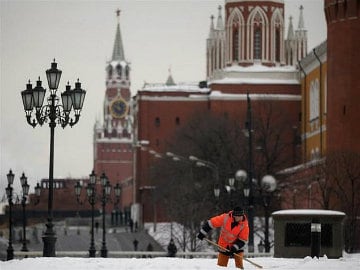
File Photo of the Kremlin
Moscow:
Some Russian teachers have accused Moscow of returning to Soviet-style indoctrination after the education ministry told them to teach pupils the government line on Crimea's annexation, the Kommersant daily reported Wednesday.
Lesson plans published by the education ministry on its website encourage teachers to discuss with pupils of all ages the topic: "Crimea and Sevastopol: their historic role for Russia."
Teachers are instructed to show that Russia's actions in Crimea were "peacekeeping and humanitarian" and aimed at "protecting their geopolitical interests and those of the Russian and Russian-speaking population."
A compulsory aspect is citing President Vladimir Putin's March 18 address to the nation giving his reasons for Crimea's annexation, the ministry says.
The lesson plan says that the decision by Soviet leader Nikita Khrushchev in 1954 to hand Crimea to Ukraine was "in violation of the law" while its "Ukrainisation" in the 1990s violated the rights of its residents.
Moscow's takeover meant that Crimea, which is "generously soaked in Russian blood," has "once again ended up with its Motherland - Russia!" the lesson plan says.
Some teachers slammed what they called a return to Soviet-style indoctrination.
"The government, as in Soviet times, is openly bringing its ideology into schools," a history teacher and textbook author, Leonid Katsva, told Kommersant.
"Evidently the education ministry thinks that schools are obliged to play the role of propagandist," a professor of Volgograd University, Ivan Kurilla, told the daily.
Others argued teachers had a responsibility to tell pupils about what is happening.
"Pupils ask these questions of their own accord. They need to be discussed openly and honestly," Natalya Lyubomirskaya, the headmistress of the lycee linked to Moscow's Higher School of Economics, told Kommersant.
The education ministry guidelines say that Crimea's annexation must be shown as justified "based on international law and moral and ethical norms."
The ministry says teachers should reassure pupils of the "temporary nature" of difficulties in economic, political and diplomatic relations with Ukraine, a "brother neighbour country."
Lesson plans published by the education ministry on its website encourage teachers to discuss with pupils of all ages the topic: "Crimea and Sevastopol: their historic role for Russia."
Teachers are instructed to show that Russia's actions in Crimea were "peacekeeping and humanitarian" and aimed at "protecting their geopolitical interests and those of the Russian and Russian-speaking population."
A compulsory aspect is citing President Vladimir Putin's March 18 address to the nation giving his reasons for Crimea's annexation, the ministry says.
The lesson plan says that the decision by Soviet leader Nikita Khrushchev in 1954 to hand Crimea to Ukraine was "in violation of the law" while its "Ukrainisation" in the 1990s violated the rights of its residents.
Moscow's takeover meant that Crimea, which is "generously soaked in Russian blood," has "once again ended up with its Motherland - Russia!" the lesson plan says.
Some teachers slammed what they called a return to Soviet-style indoctrination.
"The government, as in Soviet times, is openly bringing its ideology into schools," a history teacher and textbook author, Leonid Katsva, told Kommersant.
"Evidently the education ministry thinks that schools are obliged to play the role of propagandist," a professor of Volgograd University, Ivan Kurilla, told the daily.
Others argued teachers had a responsibility to tell pupils about what is happening.
"Pupils ask these questions of their own accord. They need to be discussed openly and honestly," Natalya Lyubomirskaya, the headmistress of the lycee linked to Moscow's Higher School of Economics, told Kommersant.
The education ministry guidelines say that Crimea's annexation must be shown as justified "based on international law and moral and ethical norms."
The ministry says teachers should reassure pupils of the "temporary nature" of difficulties in economic, political and diplomatic relations with Ukraine, a "brother neighbour country."
Track Latest News Live on NDTV.com and get news updates from India and around the world

